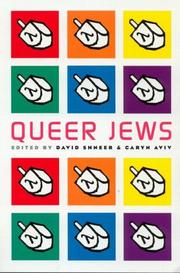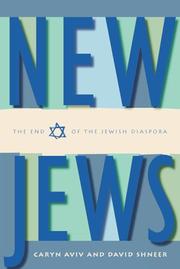| Listing 1 - 8 of 8 |
Sort by
|
Book
ISBN: 1283864169 081355019X 9780813550190 9780813548845 0813548845 9781283864169 Year: 2010 Publisher: New Brunswick, NJ
Abstract | Keywords | Export | Availability | Bookmark
 Loading...
Loading...Choose an application
- Reference Manager
- EndNote
- RefWorks (Direct export to RefWorks)
Most view the relationship of Jews to the Soviet Union through the lens of repression and silence. Focusing on an elite group of two dozen Soviet-Jewish photographers, including Arkady Shaykhet, Alexander Grinberg, Mark Markov-Grinberg, Evgenii Khaldei, Dmitrii Baltermants, and Max Alpert, Through Soviet Jewish Eyes presents a different picture. These artists participated in a social project they believed in and with which they were emotionally and intellectually invested-they were charged by the Stalinist state to tell the visual story of the unprecedented horror we now call the Holocaust. These wartime photographers were the first liberators to bear witness with cameras to Nazi atrocities, three years before Americans arrived at Buchenwald and Dachau. In this passionate work, David Shneer tells their stories and highlights their work through their very own images-he has amassed never-before-published photographs from families, collectors, and private archives. Through Soviet Jewish Eyes helps us understand why so many Jews flocked to Soviet photography; what their lives and work looked like during the rise of Stalinism, during and then after the war; and why Jews were the ones charged with documenting the Soviet experiment and then its near destruction at the hands of the Nazis.
World War, 1939-1945 --- War photography --- Documentary photography --- Jewish photographers --- Photographers --- European War, 1939-1945 --- Second World War, 1939-1945 --- World War 2, 1939-1945 --- World War II, 1939-1945 --- World War Two, 1939-1945 --- WW II (World War, 1939-1945) --- WWII (World War, 1939-1945) --- History, Modern --- Combat photography --- Photography, Combat --- Photography, War --- Photojournalism --- Photography, Documentary --- Photography --- Artists --- Photography. --- History. --- Photographes --- Photographes juifs --- Photographie documentaire --- 2ème guerre mondiale --- Photographie de guerre --- Biography. --- Pictorial works --- Biographie --- Photographie --- Ouvrages illustrés

ISBN: 0415931673 1317795040 1315811278 1317795059 9781317795049 9781317795056 9781315811277 0415931665 9780415931663 9780415931670 0415941288 9780415941280 041594127X 9781317795032 Year: 2002 Publisher: New York
Abstract | Keywords | Export | Availability | Bookmark
 Loading...
Loading...Choose an application
- Reference Manager
- EndNote
- RefWorks (Direct export to RefWorks)
Queer Jews describes how queer Jews are changing Jewish American culture, creating communities and making room for themselves, as openly, unapologetically queer and Jewish. Combining political analysis and personal memoir, these essays explore the various ways queer Jews are creating new forms of Jewish communities and institutions, and demanding that Jewish communities become more inclusive.
Jewish gays --- Homosexuality --- Gay Jews --- Gays --- Religious aspects --- Judaism. --- Sex --- Sex (in religion, folklore, etc.) --- Sex and religion --- Phallicism --- religion --- anthropology --- sexuality --- gender --- cross-cultural perspective --- Jewish gay people

ISBN: 9781594511721 9781594511714 1594511721 1594511713 Year: 2016 Publisher: London : Routledge,
Abstract | Keywords | Export | Availability | Bookmark
 Loading...
Loading...Choose an application
- Reference Manager
- EndNote
- RefWorks (Direct export to RefWorks)
"Queer in America, Now and Then Contrasting queer life today and in years past, this landmark book brings together autobiographies, poetry, film studies, maps, documents, laws, and other texts to explore the meaning and practice of the word queer. By this Shneer and Aviv mean: queer as both a form of social violence and a call to political activism; queer as played by Robin Williams and Sharon Stone and as lived by Matthew Shepard and Brandon Teena; queer in the courthouses of Washington D.C. and on the streets of hometown America. Contextualizing these contemporary stories with ones from the past, and understanding them through the analytic tools of feminist social criticism and history, the authors show what it means to be queer in America." --
Homosexuality --- Gays --- Gay rights --- Gay liberation movement --- Homophobia --- Queer theory. --- Gay people

ISBN: 0814705367 1429414227 9781429414227 0814740170 9780814740170 0814740189 9780814740187 9780814705360 Year: 2005 Publisher: New York, NY
Abstract | Keywords | Export | Availability | Bookmark
 Loading...
Loading...Choose an application
- Reference Manager
- EndNote
- RefWorks (Direct export to RefWorks)
For many contemporary Jews, Israel no longer serves as the Promised Land, the center of the Jewish universe and the place of final destination. In New Jews, Caryn Aviv and David Shneer provocatively argue that there is a new generation of Jews who don't consider themselves to be eternally wandering, forever outsiders within their communities and seeking to one day find their homeland. Instead, these New Jews are at home, whether it be in Buenos Aires, San Francisco or Berlin, and are rooted within communities of their own choosing. Aviv and Shneer argue that Jews have come to the end of their diaspora; wandering no more, today's Jews are settled.In this wide-ranging book, the authors take us around the world, to Moscow, Jerusalem, New York and Los Angeles, among other places, and find vibrant, dynamic Jewish communities where Jewish identity is increasingly flexible and inclusive. New Jews offers a compelling portrait of Jewish life today.
Israel and the diaspora. --- Jewish diaspora. --- Social integration. --- Jews --- Jewish diaspora --- Diaspora, Jewish --- Galuth --- Human geography --- Inclusion, Social --- Integration, Social --- Social inclusion --- Sociology --- Belonging (Social psychology) --- Identity, Jewish --- Jewish identity --- Jewishness --- Jewish law --- Jewish nationalism --- Cultural assimilation. --- Identity. --- Attitudes toward Israel --- Diaspora --- Migrations --- Ethnic identity --- Race identity --- Legal status, laws, etc. --- Jews. --- argument. --- choosing. --- communities. --- consider. --- dont. --- eternally. --- find. --- forever. --- found. --- generation. --- have. --- home. --- homeland. --- instead. --- outsiders. --- provocative. --- seeking. --- that. --- their. --- themselves. --- there. --- wandering.
Book
ISBN: 9780814785249 Year: 2009 Publisher: New York, NY
Abstract | Keywords | Export | Availability | Bookmark
 Loading...
Loading...Choose an application
- Reference Manager
- EndNote
- RefWorks (Direct export to RefWorks)
Book

ISBN: 081434478X 0814344798 Year: 2020 Publisher: Wayne State University Press
Abstract | Keywords | Export | Availability | Bookmark
 Loading...
Loading...Choose an application
- Reference Manager
- EndNote
- RefWorks (Direct export to RefWorks)
Book

ISBN: 1978830823 Year: 2022 Publisher: New Brunswick : Rutgers University Press,
Abstract | Keywords | Export | Availability | Bookmark
 Loading...
Loading...Choose an application
- Reference Manager
- EndNote
- RefWorks (Direct export to RefWorks)
This volume provides new, groundbreaking views of Jewish life in various countries of the pro-Soviet bloc from the end of the Second World War until the collapse of Communism in late 1989. The authors, twelve leading historians and anthropologists from Europe, Israel and the United States, look at the experience of Jews under Communism by digging beyond formal state policy and instead examining the ways in which Jews creatively seized opportunities to develop and express their identities, religious and secular, even under great duress. The volume shifts the focus from Jews being objects of Communist state policy (and from anti-Jewish prejudices in Communist societies) to the agency of Jews and their creativity in Communist Europe after the Holocaust. The examination of Jewish history from a transnational vantage point challenges a dominant strand in history writing today, by showing instead the wide variety of Jewish experiences in law, traditions and institutional frameworks as conceived from one Communist country to another and even within a single country, such as Poland, Czechoslovakia, Hungary, East Germany, and the Soviet Union. By focusing on networks across east-central Europe and beyond and on the forms of identity open to Jews in this important period, the volume begins a crucial rethinking of social and cultural life under Communist regimes.
Jews --- Identity. --- Social conditions. --- Social life and customs. --- Communist countries --- Ethnic relations. --- Judaism, Jews, Jewish people, Communism, Socialism, Jewish studies, sociology, Soviet bloc, USSR, Soviet Union, Cold War, Europe: Israel, Holocaust, state policy, religion, American, United States, USA, Poland, Czechoslovakia, Eastern European, Central Europe, regimes, government, secular, secularism, identity, Jewish identity, history, Hungary, East Germany, Germany.
Book

ISBN: 1618110519 9781618110510 9781936235599 1936235595 Year: 2012 Publisher: Boston, MA
Abstract | Keywords | Export | Availability | Bookmark
 Loading...
Loading...Choose an application
- Reference Manager
- EndNote
- RefWorks (Direct export to RefWorks)
John Doyle Klier's pioneering publications on the relations between Jews and the Russian social order-on topics such as public opinion, governance, conversion, Russification politics, antisemitism, and pogroms-have influenced an entire generation of new scholarship. Jews in the East European Borderlands, a collection of essays honoring Klier's life and work, brings together some of the most innovative scholarship in the field. Focusing on the complex, often violent, entanglements between Jews and Russians, historians and literary scholars critically reassess the artifacts of high culture, including Yiddish and Russian prose and poetry, as well as dimensions of daily life, including letter-writing, diaries, the work of philanthropy, photojournalism, and the mass circulation press.
Jews --- Antisemitism --- Anti-Jewish attitudes --- Anti-Semitism --- Ethnic relations --- Prejudices --- Philosemitism --- Hebrews --- Israelites --- Jewish people --- Jewry --- Judaic people --- Judaists --- Ethnology --- Religious adherents --- Semites --- Judaism --- History
| Listing 1 - 8 of 8 |
Sort by
|

 Search
Search Feedback
Feedback About UniCat
About UniCat  Help
Help News
News